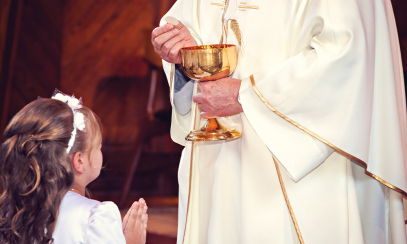
Question: Why does the Catholic Church call Mass “the Eucharistic sacrifice”?
Answer: At every Mass, the once-and-for-all sacrifice of Jesus on the cross – the divine sacrifice which redeems the world – is made present to us in a real but mystical way.
Answer: At every Mass, the once-and-for-all sacrifice of Jesus on the cross – the divine sacrifice which redeems the world – is made present to us in a real but mystical way.
A popular television show in the 1950s was Life Is Worth Living, featuring Bishop Fulton Sheen. In those years prior to the Second Vatican Council, it was commonplace for clerics like Sheen to speak of “the Holy Sacrifice of the Mass” – and with good reason. Although this phrasing is not used as much today, Catholic teaching makes it clear that at every Mass, we are truly present at Christ’s once-and-for-all redemptive sacrifice on Calvary. God is above time and all-powerful, so he can and does make the sacrifice of Jesus on the cross present to us again at Mass…in order that we might receive the graces that flow from our Savior’s supreme act of sacrificial love.
In reference to a famous teaching of Vatican II, we often hear that “the Eucharist is the source and summit of the Christian life.” This is a beautiful and potentially life-changing statement. But the Vatican II document on the Church actually states that “the Eucharistic sacrifice” is “the fount and apex of the whole Christian life…” (Lumen Gentium, no. 11)
This term, “Eucharistic sacrifice,” hearkens back to the Council of Trent in the 1500s which, in response to concerns some Protestant reformers had about the Mass, explained that the Catholic Mass does not involve an endless series of “sacrificing Jesus” anew. Rather, the unique sacrifice of the cross is made present to the faithful, though in an unbloody, sacramental manner at Mass. And, of course, for there to be a sacrifice, there must be a priest to offer the sacrifice. Catholic teaching holds that it is actually Christ, “the great high priest,” (Heb 4:14) who is the main celebrant at each Mass – through the ministry of a (merely) human bishop or priest. In the Eucharistic sacrifice, Christ is not only the chief priest; he is also the Paschal victim – the Lamb of God who takes away the sins of the world.
The Catechism of the Catholic Church concisely summarizes the teaching of Trent on the Eucharist in this way: “The Eucharist is thus a sacrifice because it re-presents (makes present) the sacrifice of the cross, because it is its memorial and because it applies its fruit…’” (CCC 1366) If we sincerely want to see the fruits of Christ’s redemptive sacrifice grow in our own lives, there is a simple but profound answer: Let’s joyfully participate in Mass, at least on holy days of obligation and on Sundays (or at Saturday vigil Masses, which count as Sundays)!



